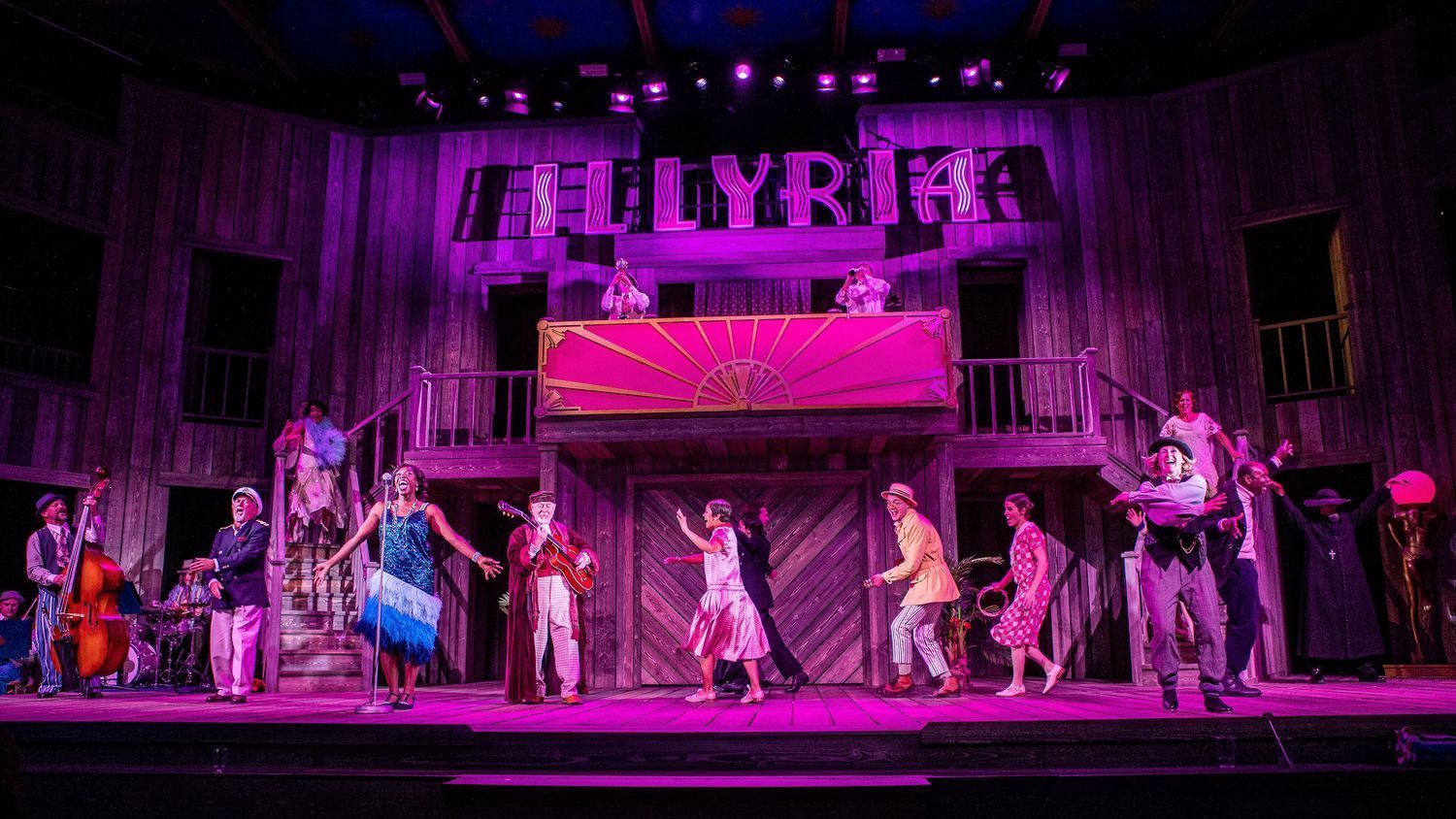Although Shakespeare’s Twelfth Night was originally written for its namesake winter festival, which was celebrated with excess of music, masked balls, misrule, and general revelry, Shakespeare’s subtitle, “What You Will”, is perhaps more apt for Joyce Branagh’s sunny Jazz Age re-imagining. Shakespeare’s cold, pagan winter becomes a warm, witty and wonderful summer treat, pleasing the youngest to oldest audience members at Shakespeare’s Rose Theatre in York this summer.
Wonderful lightness in tone lets the comic character of Twelfth Night shine through making the Shakespearean language highly accessible. Having seen this company’s production of A Midsummer Night’s Dream last year (now showing at the Rose Theatre at Blenheim Palace, Oxford), familiar faces and themes of mistaken identity and muddled love plots, were initially reminiscent of that play. However, the magic of this production is conjured not from fairies and enchantment but from pitch-perfect music and assured comic delivery.
Whilst this approach was highly effective in bringing out the comedy and entertainment, often lost to the modern audience, the airy festive tone jarred somewhat with the dark and morally troubling side plot of the gaslighting of Malvolio by Sir Toby Belch and Maria, both brilliantly realised by Fine Time Fontayne as an aging but cuddly libertine and the vivacious Rina Mahoney. The image of Malvolio in the infamous cross gartered yellow stockings garnered the expected laughs. However, there is no escape from the fact that their imprisonment and mental torture of Malvolio is disproportionately cruel. Claire Storey’s slightly pompous Malvolio lacked sufficient malice to justify such maltreatment suffered at the hands of fools. This play on the moral ambiguity of the Malvolio side-plot suggested, perhaps, that there is a price to be paid for the revels we all enjoy.
The Rose’s Illyria sparkled and danced its way into the hearts of the audience thanks to Max Dorey’s Art-Deco inspired set, Sara Perks’ Gatsby-esque stylings and Eammon O’Dwyer’s jovial jazz score. This all brought life and vivacity to the stage from the first song and dance of the play, setting the festive tone which the actors maintained throughout the performance with communal dancing on stage and with the groundlings at the beginning and end of the play.
A large cast of nearly 20, enabled all of the actors to inhabit their role. The entire cast made great efforts to convey the full meaning of their lines, whether that was with a well-timed pause, allowing the audience time to understand a joke, or a subtle raising of an arch eyebrow teasing out the innuendo. As the key player of the comically complicated love triangle, Olivia Onyehara made a wonderful Viola with a clear relationship with the audience through her wryly perplexed asides whilst Leandra Ashton as Olivia played blissfully, and lustfully, unaware of Viola’s true identity. Completing the love triangle Mark Holgate imagined lovestruck Orsino as seemingly unaware that his high-minded pronouncements on love made him comically pompous. Feste the fool is a difficult character to master in a modern reinterpretation – the idea of a court jester being so odd and outdated, although some modern leaders appear to combine the roles of both king and fool. However, Clare Corbett’s Chaplin-esque interpretation of this character deftly combined clowning elements with the wit and wordplay while not shying away from the character’s moral ambiguity.
The character of Sir Andrew Aguecheek can sometimes seem overshadowed by that of Sir Toby. Indeed, in this production Fine Time Fontayne’s ability to conjure bottles of booze out of thin air suggested that he was going to run away with all of the comic episodes. However, Alex Phelps as Sir Andrew gave a hint of Elizabethan dandy strutting in his short-cut ochre raincoat, his every mock curtsey and flourish was a finely judged manifestation of his character’s eccentricity – like a PG Wodehouse toff of the most ridiculous order – this is quite frankly genius and worth the admission price all on its own.
For a rollickingly good few hours of good-humoured Shakespeare there is none better in the North of England this summer. This seasonal pop-up theatre, emulating the Globe in its design, is developing into a cultural highlight, allowing high quality and high energy Shakespeare to be seen outside of London in beautiful locations- historic York and Blenheim Palace, Oxford. I for one hope that the Rose Theatre will blossom in the years to come.
Rose Theatre productions 2019
York: Twelfth Night, Hamlet, The Tempest and Henry V.
Oxford: A Midsummer Night’s Dream, Romeo and Juliet, Macbeth and Richard III.



